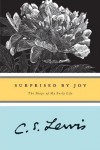The Pilgrim's Regress by C.S. Lewis
"I dreamed of a boy who was born in the land of Puritania and his name was John."
In The Pilgrim's Regress, John is a boy who lives in Puritania and is given a rather legalistic view of the Landlord of his country by the overseer or Steward. When he sees a shimmering Island in a vision through a crack in a wall, he experiences such an intense longing that he leaves Puritania, setting out on a journey to discover its location. With this incredible longing (Sehensucht) throbbing inside him, he tries to assuage it by a number of worldly means. The basic gist of the story is that John starts out, running from something he doesn't truly understand and running to something he doesn't truly understand. Through his numerous adventures, many with his friend Vertue, he discovers that he has run right back to where he had begun, Puritania, but thanks to the enlightenment he has received on his travels from Mr. Halfway & son, the Clevers, Mr. Mammon, the Giant, Reason, Mother Kirk, Three Pale Men, Mr. Savage, Mr. Broad, Wisdom, Contemplation, the Hermit, and Silkisteinsauga, he finds the answers to his questions and is able to pass over the brook and into the light.
One of the many strengths of this book lies in the fact that John didn't simply learn from the "good" people he met along his journey. Each of his encounters taught him something about life and his beliefs, which helped him to grow into the person he became at the end of the story.
This was one of the hardest reviews I have written so far. You begin with what appears to be a simple allegory of C.S. Lewis' own journey to faith, yet the reader is soon made aware that embedded in this simple story is a plethora of incredibly complex material and ideas. Lewis incorporated numerous ideologies such as Romanticism, Neo-Romanticism, Communism, Freudianism, Facism, etc. along with imagery, metaphors, and a host of allusions and quotes that is mind-boggling. The fact that he wrote this book while on vacation at his friend Arthur Greeves' house in a mere two weeks, and was able to incorporate the wide-ranging scope of material that he did, is astounding!
In talking about his book years later, Lewis appeared almost embarrassed by it: "On re-reading this book ten years after I wrote it, I find its chief faults to be those two which I myself least easily forgive in the books of other men: needless obscurity, and an uncharitable temper." He blames his youthful idealism on failing to give the reader the guidance to understand his personal journey. I, for one, can forgive him this minor fault. To mine The Pilgrim's Regress of its treasures is a difficult task, but one that is well worth the effort.











